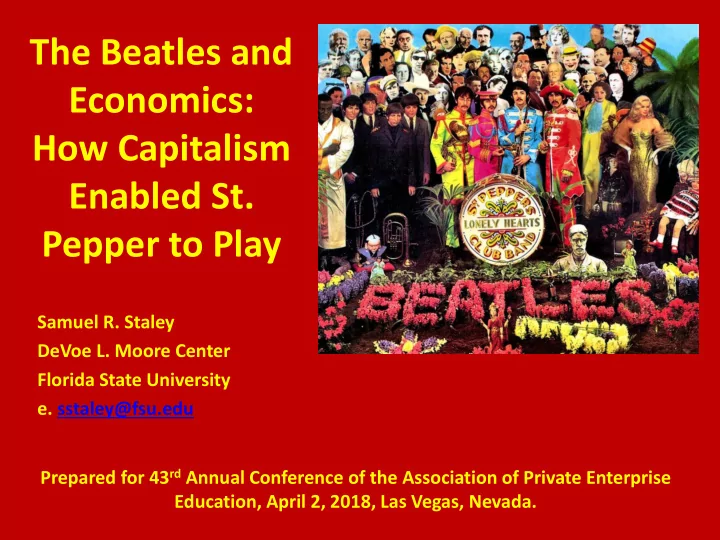

The Beatles and Economics: How Capitalism Enabled St. Pepper to Play Samuel R. Staley DeVoe L. Moore Center Florida State University e. sstaley@fsu.edu Prepared for 43 rd Annual Conference of the Association of Private Enterprise Education, April 2, 2018, Las Vegas, Nevada.
Beatles were the most influential popular music act in the 20 th century • Best selling band in history (800 million albums sold) • Most number 1 hits on Billboard’s Hot 100 (20) • Rock & Roll Hall of Fame – Group (1988) Founded in Liverpool, England • – John (1994) Active 1960-1970 • – Paul (1999) Effectively disbanded in 1968 – – George (2004) Members were not formally • – Ringo (2015) trained on their instruments APEE, April 2, 2018 Staley, Capitalism and Sgt. Pepper 2
The Beatles 1964 1967 APEE, April 2, 2018 Staley, Capitalism and Sgt. Pepper 3
The Beatles: A Black Swan event? • A Black Swan event is – Disruptive – Fundamentally reshapes an industry/economy – Cannot be forecast • Can economics explain the rise of the Beatles? Could their rise and influence have been predicted? • Sgt. Pepper’s Lonely Hearts Club Band APEE, April 2, 2018 Staley, Capitalism and Sgt. Pepper 4
Sgt. Pepper’s Lonely Hearts Club Band • Released in 1967 • 32 million copies sold • Watershed album for music – Rolling Stone magazine: “most important rock & roll album ever made” • Threshold album for the Beatles – Largely experimental music but includes a diverse range of music APEE, April 2, 2018 Staley, Capitalism and Sgt. Pepper 5
Economics of Sgt. Pepper • Inputs (11/66 to 4/67) Hours spent recording and editing Beatles albums • Compared to previous 800 albums: 700 600 – 30 x hours in recording 500 and editing 400 – 60 x the cost to the 300 studio 200 • Five months in the 100 studio (400 hours) 0 Hours Please, Please Me Sgt. Pepper APEE, April 2, 2018 Staley, Capitalism and Sgt. Pepper 6
What enabled this effort? • Beatles were the top selling/grossing act in the world • Stopped touring in 1966 at the end of their tour of Japan & Philipines • Individual Beatles were independently wealthy • Studio had bank and a bankable act APEE, April 2, 2018 Staley, Capitalism and Sgt. Pepper 7
Per Capita GDP (current US$) $6,000 $5,247 $5,000 $3,828 $4,000 $3,007 $3,000 $2,348 $2,027 $1,851 $2,000 $1,380 $920 $1,000 $479 $0 USA UK Japan 1960 1965 1970 APEE, April 2, 2018 Staley, Capitalism and Sgt. Pepper 8
Growth in Youth Population U.S. Teenage Population Growth 25,000,000 Beatles Era 20,000,000 15,000,000 10,000,000 5,000,000 0 1930 1940 1950 1960 1970 1980 10-14 years old 15-19 years old 20-24 years old APEE, April 2, 2018 Staley, Capitalism and Sgt. Pepper 9
Teenage workforce was growing • Teenage male labor force participation: • 1955: 58.9% U.S. Teenage Employment (16-19 yrs old) • 1965: 50.4% 9000 • 1973: 59.8% 8000 7000 • Teenage female labor force participation: 6000 5000 • 1955: 39.7% 4000 • 1965: 38.0% 3000 • 1973: 47.8% 2000 • Discretionary income 1000 was increasing as the 0 Beatles peaked 1950 1955 1965 1973 creatively Employed Men Women APEE, April 2, 2018 Staley, Capitalism and Sgt. Pepper 10
Conclusions • Wealth creation was central to the growth of popular music – Funnel resources into growing and emergent niches (e.g., rock music) • Monetizing this wealth was crucial to creating the space for the Beatles to exercise their creativity – Growth mindset – Not all bands had similar mindsets • Conclusion: Free-market capitalism was a necessary but not sufficient condition for the production and success of Sgt. Pepper’s Lonely Hearts Club Band APEE, April 2, 2018 Staley, Capitalism and Sgt. Pepper 11
Recommend
More recommend